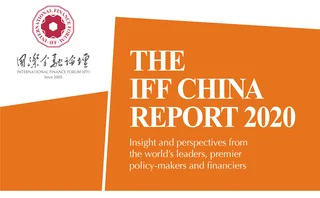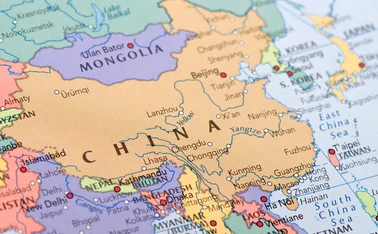
If it’s broke, fix it


In October 2019, the International Monetary Fund (IMF) downgraded global growth for 2019 to 3% – its slowest since the global financial crisis of 2007–08. The main reason given for this was rising trade barriers and increasing geopolitical tensions.
The IMF estimates that US–China trade tensions will cumulatively reduce global GDP by 0.8% by the end of 2020. Growth is also weighed down by country-specific factors in several emerging market economies, and by structural forces such as low productivity growth and ageing populations in advanced economies.

The weakness in growth is driven by a sharp deterioration in manufacturing activity and global trade, with higher tariffs and prolonged trade policy uncertainty damaging investment and demand for capital goods.
In contrast to extremely weak manufacturing and trade, the services sector fortunately continues to hold up worldwide. This has kept labour markets buoyant and wage growth and consumer spending healthy in advanced economies. There are, however, some initial signs of softening in the services sector in the US and eurozone.
The IMF projects a modest improvement in global growth to 3.3% in 2020 – a further downward revision of 0.2% from its April 2019 projections. However, unlike the synchronised slowdown, this recovery is not broad-based and remains precarious.
However, there are several downside risks to growth. Heightened trade and geopolitical tensions, including risks related to Brexit could further disrupt economic activity and derail an already fragile recovery in emerging market economies and the eurozone. This could lead to an abrupt shift in risk sentiment, financial disruptions and a reversal in capital flows to emerging market economies. In advanced economies, low inflation could become entrenched and constrain monetary policy space further into the future, limiting its effectiveness.
A deterioration in business sentiment, weakening economic activity and intensifying downside risks to the outlook have prompted central banks worldwide – including the European Central Bank and the US Federal Reserve – towards an easy‑money policy. Weighted by GDP, around 70% of economies have adopted a more accommodative monetary stance. The shift has been accompanied by a sharp decline in longer-term yields. In some major economies, interest rates are even negative.
Investors have interpreted central bank actions as a turning point in the monetary policy cycle. As the pace of global economic activity remains weak, financial markets now expect rates to stay lower for longer than anticipated.
But loose financial conditions come at a cost. They encourage investors to take more chances in a quest for higher returns, and lead to a continued build-up of financial vulnerabilities – particularly in the corporate sector and among non-bank financial institutions. Even Warren Buffett is reported to be sitting on a massive cash pile of US$128 billion and not investing.
Very low rates have prompted institutional investors such as insurance companies, pension funds and asset managers to reach for yield and take on riskier and less liquid securities to generate targeted returns. For example, pension funds have increased their exposure to alternative asset classes such as private equity and real estate.
This situation poses a dilemma for policy-makers. On one hand, they may want to keep financial conditions easy to counter a deterioration in the economic outlook. On the other, they must guard against a further accretion of vulnerabilities.
What then should the world and China do at this time? Asia remains the fastest-growing major region in the world, accounting for more than two-thirds of global growth in 2019. China alone accounts for 39% of global growth, India 16% and members of the Association of Southeast Asian Nations 10%. In the global environment of low growth, Asia – with China in the leading role – emerged as the world economy’s growth engine.
This development provides room for global economies to pursue difficult structural reforms. It is hard to deny that China’s massive growth in the past decade was the single most important factor in alleviating negative spillovers of the global financial crisis into Asia, as well as many commodity-exporting economies in the world.
The role for China today
China is now a globally integrated $13 trillion economy, the actions of which have global reverberations. If China is to continue to benefit from globalisation and support the aspirations of developing countries, it will need to focus on how to limit adverse spillovers from its own policies and invest in ensuring that globalisation can be sustainable. China would likely serve itself well by addressing many of the policy issues that have thus far been contentious. These include:
- Stronger protections for intellectual property – This will benefit China as it becomes a world leader in advanced technologies and granting international patents
- Reduced trade barriers – Particularly related to investment rules and government procurement procedures, this will increase competition, reduce costs and enhance productivity – all benefiting the Chinese people in the long run
- Acceleration of market-oriented economic reforms – This will help China make more efficient use of scarce resources.
During the Qingdao Multinationals Summit in October 2019, which was approved by the State Council of the People’s Republic of China, and co-hosted by the Chinese Ministry of Commerce and the People’s Provincial Government of Shandong, President Xi Jinping sent a message praising the further opening-up of China’s markets. At the second China International Import Expo, held in Shanghai in November 2019, President Xi reiterated the further opening-up of China’s economy by expanding imports and cutting tariffs.
It is also noteworthy that the new major Foreign Investment Law of the People’s Republic of China, passed by the 13th National People’s Congress in March 2019, came into force in January 2020. The new law replaces three foreign invested entities laws. It introduces national treatment and a negative system regime, and promotes and protects foreign investment and intellectual property rights.
However, the world cannot stand aside and let one country do all the hard work. We seem to be living in an era of doubt and questions about the global order. We have seen an erosion of trust in bedrock institutions at national, regional and global levels, a trend especially evident in the advanced economies of Europe and the US.
Digital and financial revolution
And yet multilateralism is our only way forward. Even though trade co-operation has driven an unprecedented period of growth and prosperity over the past 70 or more years, today it faces backlash – partly because too many people have been left out. Clearly, we need to de-escalate these disputes of inequality among nations and people. We must reform the global trading system to make it even better, fairer and stronger for all. That means fixing the system together – not tearing it apart.
In the area of advanced technology, for example, we know that the digital revolution presents both great promise and great peril. Biotech, robotics, artificial intelligence, the ‘internet of things’, big data, financial technology – known as fintech – blockchain and other advanced technologies will all create new industries and jobs.
Fintech, especially, is an area to take note of. Indeed, within a little over 10 years of smartphones appearing on the market, banks are being threatened by fintech as never before since the foundation of Banca Monte dei Paschi di Siena in northern Italy in the late 15th century.
This phenomenon is nothing less than a revolution in the financial sector – the first ‘financial revolution’. Fintech certainly has the potential to unleash economic dynamism and reduce poverty – especially by providing financial services to the 1.7 billion people currently without access to banking. But again, it needs to be managed carefully to protect financial stability and safety and, since digital means global, will require a multilateral effort.
In this day and age, multilateralism could not be more important to improve the lives of all of the world’s citizens and ensure the economic benefits of globalisation are shared much more broadly and evenly.
Multilateralism happens when governments and institutions are both accountable and working together for the common good. Only this can allow them to take on the many transnational challenges that no government alone – nor any small group of governments working together – can handle.
Working together, we will be better able to prevent a damaging downturn in the coming years and a dystopian future in the coming decades. With ingenuity and international co‑operation, we can make the most of new technologies and new challenges and create shared and sustained prosperity.
Only users who have a paid subscription or are part of a corporate subscription are able to print or copy content.
To access these options, along with all other subscription benefits, please contact info@centralbanking.com or view our subscription options here: subscriptions.centralbanking.com/subscribe
You are currently unable to print this content. Please contact info@centralbanking.com to find out more.
You are currently unable to copy this content. Please contact info@centralbanking.com to find out more.
Copyright Infopro Digital Limited. All rights reserved.
As outlined in our terms and conditions, https://www.infopro-digital.com/terms-and-conditions/subscriptions/ (point 2.4), printing is limited to a single copy.
If you would like to purchase additional rights please email info@centralbanking.com test test test
Copyright Infopro Digital Limited. All rights reserved.
You may share this content using our article tools. As outlined in our terms and conditions, https://www.infopro-digital.com/terms-and-conditions/subscriptions/ (clause 2.4), an Authorised User may only make one copy of the materials for their own personal use. You must also comply with the restrictions in clause 2.5.
If you would like to purchase additional rights please email info@centralbanking.com test test test







